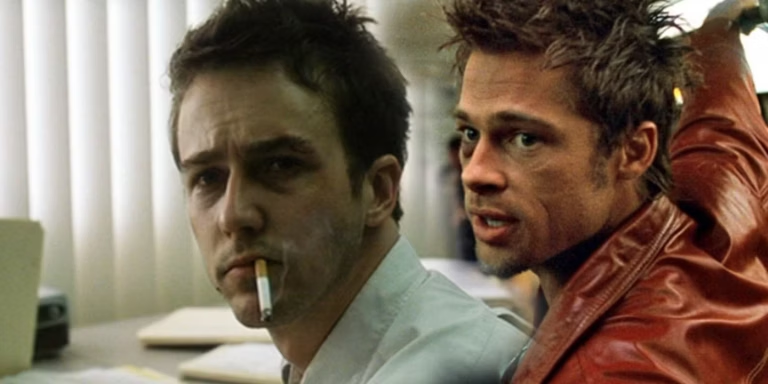David Fincher’s Fight Club (1999), based on Chuck Palahniuk’s novel, is often interpreted as a scathing critique of consumerism and modern masculinity. However, beneath its anarchistic themes lies a deep psychological exploration of Carl Jung’s concept of the shadow—the unconscious, repressed aspects of the self that individuals refuse to acknowledge. The film provides a gripping portrayal of a man’s confrontation with his own shadow, manifesting in the form of Tyler Durden, and illustrates the dangers of both ignoring and embracing it too fully.
The Shadow and the Narrator’s Repression
Jungian psychology posits that every individual harbors a shadow—a hidden self consisting of instincts, weaknesses, desires, and repressed traits that contradict the persona (the outward-facing self). In Fight Club, Edward Norton’s character, known only as the Narrator, begins as a passive, disillusioned office worker trapped in the monotony of corporate life. His existence is dictated by societal expectations: a well-furnished apartment, a stable job, and an avoidance of his deeper, more primal nature. The Narrator’s insomnia and emotional numbness symbolize his disconnection from his true self, a key indication that his shadow has been neglected.
Tyler Durden: The Manifestation of the Shadow
Tyler Durden (Brad Pitt) emerges as the Narrator’s alter ego, the living embodiment of everything he has suppressed—aggression, confidence, charisma, and a rejection of societal norms. Tyler is the unfiltered expression of the Narrator’s desires: to be free, powerful, and uninhibited by convention. He challenges consumer culture, mocks the pursuit of material wealth, and embraces chaos. This transformation aligns with Jung’s notion that if the shadow remains unintegrated, it will find its own way to manifest, often in destructive or uncontrollable ways.
The Dangers of Over-Identifying with the Shadow
As the film progresses, Tyler leads the Narrator deeper into anarchy, from underground fights to the formation of Project Mayhem, an extremist group bent on dismantling modern society. This escalation illustrates Jung’s warning about over-identifying with the shadow: while it contains vital energy and authenticity, unchecked immersion in its darkness leads to nihilism and self-destruction. The Narrator’s increasing loss of control highlights the psychological danger of surrendering entirely to suppressed impulses without conscious integration.
Integration: Confronting the Shadow
The climax of Fight Club reflects the Jungian process of individuation—the reconciliation of the self with its shadow. The Narrator realizes that Tyler is not a separate person but a projection of his repressed self. In rejecting Tyler’s ideology and ultimately ‘killing’ him, the Narrator symbolically reclaims control over his psyche. This moment signifies an attempt to integrate his shadow rather than be dominated by it, aligning with Jung’s idea that true wholeness comes not from destroying the shadow but from understanding and incorporating it into conscious awareness.
Conclusion
Fight Club serves as a modern cinematic representation of the Jungian shadow, demonstrating both the necessity and danger of confronting one’s repressed desires and instincts. The film warns against both extreme suppression and unchecked indulgence, advocating instead for a conscious and balanced integration of one’s darker self. By doing so, it offers a powerful psychological commentary on identity, transformation, and self-awareness in the modern world.



Comments are closed.